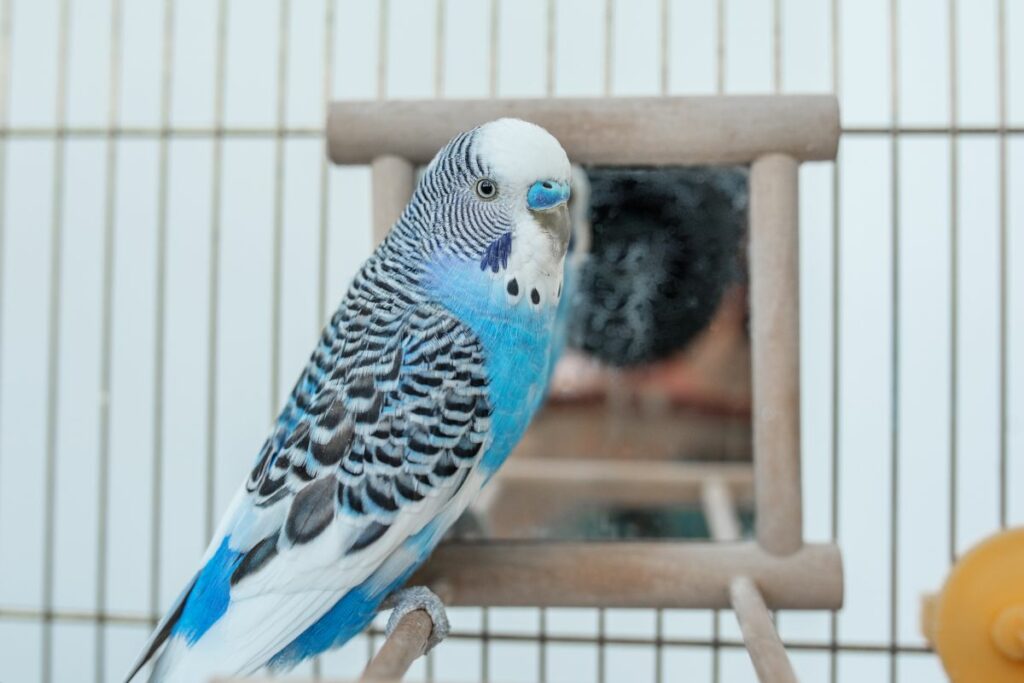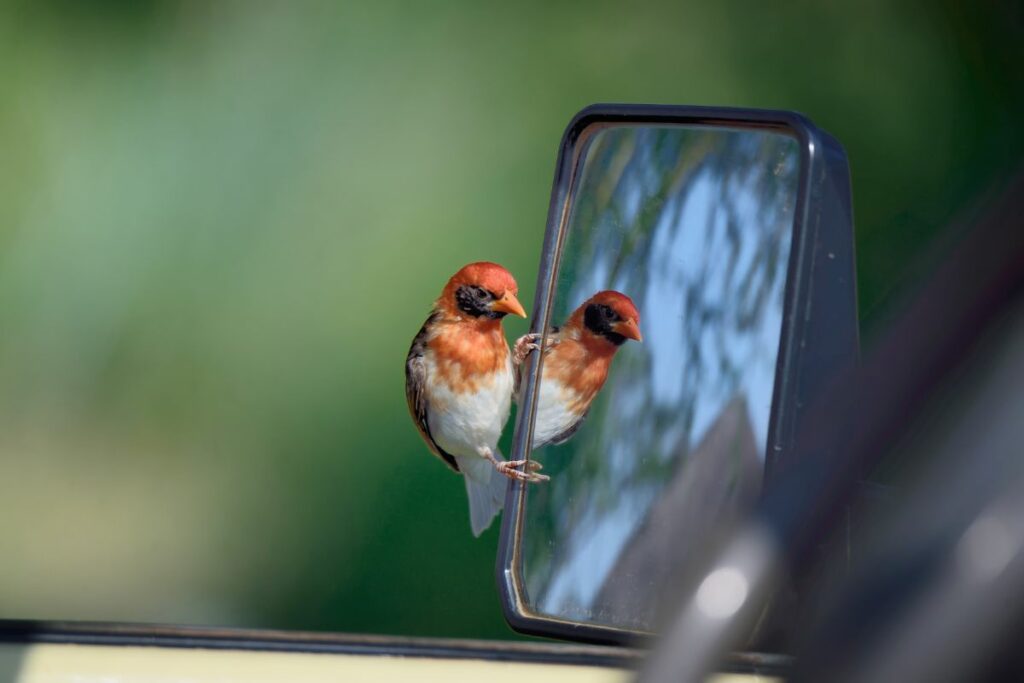As an Amazon Associate, we earn from qualifying purchases with no additional costs for you.
Many birds are social creatures, but even species that do not occur in flocks need to communicate properly with other members of their species. They use both visual and auditory cues; in other words, much of their communication and behavior is based on what they see and hear.
Birds like mirrors for two primary reasons: their reflection in a mirror looks like another bird, and the presence of another bird of the same species can make them feel less stressed or anxious. Most birds are social to some degree, and a mirror can help a lonely bird feel better.
It can be okay to place a mirror in a bird cage, but sometimes the bird does not like it. A mirror can help a pet bird feel less lonely. Birds like mirrors because they see another bird in the reflection, but this can be a problem with wild birds that will attack the perceived intruder.
Read on to learn more about why birds like a mirror and other important information about mirrors and birds.
TIP: If you want to check out the best pair of binoculars for bird watching, we recommend a pair of waterproof and fog-proof 8 x 42 binoculars like the Celestron – Outland X 8×42 Binoculars (Amazon link).
Is It Ok For A Bird To Have A Mirror?
In many cases, it is okay to place a mirror in your pet bird’s cage. However, it may be best to remove the mirror if the bird attacks it or becomes frightened or upset. Even within a species, there can be vastly different responses to a mirror.
One cockatiel may love having a mirror and will talk to it, but another cockatiel may viciously attack the perceived intruder in the cage.
Social Species
In the case of small finches like zebra finches, a mirror may help the birds feel that they are part of a flock. Zebra finches are best kept in pairs and not on their own.
This species also lives in large flocks in the wild, so they are adapted to being part of a group and are not solitary species. Zebra finches tend to like mirrors and will sit and sing to their reflections.
Birds in the wild occur as pairs or small flocks. In some species, this changes according to season. For instance, bronze mannikins occur in big flocks outside of the breeding season and then pair up when it is time to nest.
Birds In Research Labs
Some researchers suggest that a mirror is a good idea for birds that are isolated from other birds of their own or different species. It could help birds in research situations from feeling isolated and lonely and becoming stressed as a result.
Mirror Obsession
In other cases, a bird may become overly obsessed with a mirror. This could be harmful over the long term, particularly if you try to introduce another bird into the cage or want to breed the bird. It is usually better to rather buy a companion for your bird, so if you have one budgie it is best to buy another.
Other Potential Dangers Of Mirrors
Mirrors placed in a birdcage can pose a danger if they have bells or strings that can catch a bird’s foot. You need to be careful with any type of toy placed in a bird cage.
Make sure that there is no part of the toy that can be broken off and swallowed. You should also check for strings or stray wires attached to the mirror that can injure a bird.
Why Do Birds Like Mirrors?
There are at least two reasons why a bird may like a mirror.
- They think the reflection is another bird in their flock.
- They feel less lonely and stressed.
Do All Pet Birds Like Mirrors?
Not all birds like a mirror, but some birds do think that the reflection they see is a member of their flock and will sing and talk to the bird in the mirror.
The behavior depends on the species of bird, how social they are, and if the bird is a male or female. Researchers have found differences in the behavior of starlings towards a mirror between solitary males and males that are part of a pair.
Males that were raised alone or without a mate showed more activity when a mirror was placed in the cage. Starlings that were a pair did not react as much to the presence of a mirror.
Some pet birds may be afraid of the mirror or angrily attack the mirror. It is best to watch how your bird reacts to the mirror, and if it is upsetting the bird, you should remove the mirror.
Do Wild Birds Like Mirrors?
Most wild birds will not like a mirror because they perceive the reflected bird as an intruder in their territory. This can cause the bird to waste its energy trying to fight off the bird in the mirror.
For example, it is common to see a male cardinal attacking a car mirror. This is because the male bird is defending his territory from what he thinks is a rival male.
Establishing and defending territories is an important component of bird biology. In the wild, birds compete for the best feeding and nesting sites. They compete with other species and with birds of their own species.
It is the male birds that will set up and claim territory. Often you can see males chasing other males of the same species away from a particular area.
The males of many bird species will perch prominently in their territories and sing as a way to advertise to females; this also lets other males of the species know that this territory has been claimed.
What Do Birds Think Of Mirrors?
Birds, especially wild birds, do not realize that what they see in the mirror is not them but rather they think it is another bird. The presence of a mirror influences the social behavior of birds. The bird may act aggressively towards the mirror or talk and sing back to the reflection.
The response varies based on the type of bird species, if it is a male or female, and if it is a wild or domesticated species.
Can Birds See Themselves In A Mirror?
Birds can see themselves and the reflected environment in a mirror, but most species do not recognize that it is them.
However, research done on magpies, does suggest that they do recognize themselves in a mirror and, thus, show self-awareness. More research needs to be done to see if this occurs in some other species.
It may also vary based on the intelligence of the bird. Magpies are in the Corvidae or crow family, a group of birds that are known for being very intelligent.
Mirrors In Bird Rehabilitation
Birds, like many other animals, imprint on their parents when they are babies. This can pose a problem when the chicks of wild birds enter a rehabilitation (rehab) facility.
A correctly trained and permitted person can successfully rear a baby bird, but the problem is finding a way to stop the bird from imprinting on the person.
For birds to survive in the wild, they should not be tame and need to learn that they are actually birds and not humans. Releasing a tame bird into the wild is a bad idea because they are unlikely to survive for long.
Birds need to develop an awareness of dangers in the environment and know how to forage and survive in the wild. A human-imprinted bird is not able to successfully survive and thrive if released out into the wild.
Mirrors And Imprinting
A mirror is often placed in the enclosure with a fledgling bird while in a rehab facility to avoid human imprinting. It is thought that the mirror can help the bird learn its species so that they imprints on its own species rather than on a human caregiver.
It is also helpful if more than one baby of the same species is in rehab, as they can be kept together and reared together.
Other strategies can be used to prevent birds from imprinting on their human carers. Rehab facilities may limit the number of people feeding the bird and may even use screens and disguises to prevent the imprinting of baby birds on humans.
In the case of endangered whooping cranes, chicks are reared by a person wearing a crane costume. This helps the chicks to learn that they are a crane, and they learn how to forage as a crane.
Other endangered species, like the bearded vulture, are reared in captivity using a hand puppet. The puppet looks like the adult of the species so that the young vulture learns to imprint correctly on its species and not on its human caregiver.
Conclusion
There are two reasons why birds like mirrors: the bird thinks the reflection is another bird, which can trigger social behavior, and a mirror can help a bird feel less lonely.
Mirrors can be a problem for wild birds who may attack it thinking the bird in the mirror is a rival male intruding on their territory.
Some pet birds may become obsessed and aggressive when a mirror is present. Mirrors do have an advantage in wildlife rehabilitation centers where baby birds are reared. The mirrors are used to prevent birds from imprinting on the humans that are feeding them.
TIP: Are you looking for high-quality food for wild birds on your backyard? I recommend using Wagner’s products with the highest quality grains used in blending and made in the USA (Amazon links):
– Deluxe Treat Blend Wild Bird Food
– Eastern Regional Wild Bird Food
– Western Regional Wild Bird Food
– Midwest Regional Wild Bird Food
– Southern Regional Wild Bird Food


